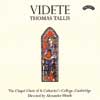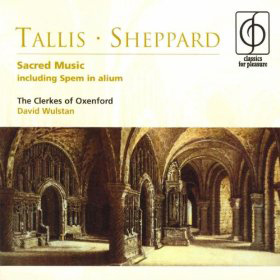Tallis Videte
English church music: a new recording from Cambridge and a bargain reissue
View record and artist detailsRecord and Artist Details
Composer or Director: Thomas Tallis
Genre:
Vocal
Label: Priory
Magazine Review Date: 7/2003
Media Format: CD or Download
Media Runtime: 61
Mastering:
Stereo
DDD
Catalogue Number: PRCD727

Tracks:
| Composition | Artist Credit |
|---|---|
| Salvator mundi Domine...Adesto nunc proprius |
Thomas Tallis, Composer
Alexander Ffinch, Conductor St Catherine's College Chapel Choir (Cambridge) Thomas Tallis, Composer |
| Audivi vocem de caelo |
Thomas Tallis, Composer
Alexander Ffinch, Conductor St Catherine's College Chapel Choir (Cambridge) Thomas Tallis, Composer |
| Salvator mundi, salva nos I |
Thomas Tallis, Composer
Alexander Ffinch, Conductor St Catherine's College Chapel Choir (Cambridge) Thomas Tallis, Composer |
| Loquebantur variis linguis |
Thomas Tallis, Composer
Alexander Ffinch, Conductor St Catherine's College Chapel Choir (Cambridge) Thomas Tallis, Composer |
| In pace in idipsum |
Thomas Tallis, Composer
Alexander Ffinch, Conductor St Catherine's College Chapel Choir (Cambridge) Thomas Tallis, Composer |
| O sacrum convivium |
Thomas Tallis, Composer
Alexander Ffinch, Conductor St Catherine's College Chapel Choir (Cambridge) Thomas Tallis, Composer |
| Videte miraculum |
Thomas Tallis, Composer
Alexander Ffinch, Conductor St Catherine's College Chapel Choir (Cambridge) Thomas Tallis, Composer |
| Homo quidam fecit coenam |
Thomas Tallis, Composer
Alexander Ffinch, Conductor St Catherine's College Chapel Choir (Cambridge) Thomas Tallis, Composer |
| Magnificat and Nunc Dimittis |
Thomas Tallis, Composer
Alexander Ffinch, Conductor St Catherine's College Chapel Choir (Cambridge) Thomas Tallis, Composer |
Composer or Director: John Sheppard, Thomas Tallis
Label: Classics for Pleasure
Magazine Review Date:
Media Format: CD or Download
Media Runtime: 69
Mastering:
Stereo
ADD
Catalogue Number: 575982-2

Tracks:
| Composition | Artist Credit |
|---|---|
| Gaude, gaude, gaude Maria virgo |
John Sheppard, Composer
(The) Clerkes of Oxenford David Wulstan, Conductor John Sheppard, Composer |
| Laudem dicite Deo |
John Sheppard, Composer
(The) Clerkes of Oxenford David Wulstan, Conductor John Sheppard, Composer |
| In pace in idipsum |
John Sheppard, Composer
(The) Clerkes of Oxenford David Wulstan, Conductor John Sheppard, Composer |
| In manus tuas I |
John Sheppard, Composer
(The) Clerkes of Oxenford David Wulstan, Conductor John Sheppard, Composer |
| Verbum caro factum est |
John Sheppard, Composer
(The) Clerkes of Oxenford David Wulstan, Conductor John Sheppard, Composer |
| Spem in alium |
Thomas Tallis, Composer
(The) Clerkes of Oxenford David Wulstan, Conductor Thomas Tallis, Composer |
| O nata lux de lumine |
Thomas Tallis, Composer
(The) Clerkes of Oxenford David Wulstan, Conductor Thomas Tallis, Composer |
| Ecce tempus idoneum |
Thomas Tallis, Composer
(The) Clerkes of Oxenford David Wulstan, Conductor Thomas Tallis, Composer |
| Loquebantur variis linguis |
Thomas Tallis, Composer
(The) Clerkes of Oxenford David Wulstan, Conductor Thomas Tallis, Composer |
| Gaude gloriosa Dei mater |
Thomas Tallis, Composer
(The) Clerkes of Oxenford David Wulstan, Conductor Thomas Tallis, Composer |
Author: mberry
Under the late Peter le Huray, St Catherine’s had already achieved a high standard: he chose his choral scholars with care and was the first to suggest introducing instrumental exhibitions as well as choral scholarships, his aim being to improve the musical profile of colleges less well-known than King’s and St John’s. Alexander Ffinch, a former organ scholar of Keble College Oxford, has brought St Catherine’s to the notice of the public with this recent recording of choral works by Tallis, and deserves to be congratulated.
The choice of pieces is satisfactorily representative of Tallis’s Latin works, giving examples of the office hymn – sung alternatim with the chant antiphon, solemn responsory (with choral elaboration treated in two ways, under-lining either the choir’s text or the cantor’s) and canticles for Vespers and Compline. The voices blend well, the choice of pitch is usually conservative, the pacing of the polyphony admirable. The chant sections, not surprisingly, follow the present trend regarding style, but they do come a shade nearer to what was probably the much slower tempo of the 16th century. By contrast, The Clerkes rush through them at breakneck speed.
But thanks are due to Classics for Pleasure for the remastering of The Clerkes’ 1973 disc of works by Tallis, including his 40-part Spem in alium, coupled with works by his contemporary, Sheppard. These historic recordings must remain available to the general public because of the light they throw on the way musicians 30 years ago were thinking about performance practice, in particular concerning pitch.
Under the direction of David Wulstan, some choirs decided that Tudor pitch was probably a minor third above today’s. This theory is convincingly demonstrated by The Clerkes, and is most striking where the top voices sing divisi in their higher register. Perhaps the most impressive of these is Gaude gloriosa Dei mater, where successive verses are sung by three, six, five (all high, an ethereal, angelic sound), then three (all low) and finally six again. The result is a glorious, breathtaking performance.
Discover the world's largest classical music catalogue with Presto Music.

Gramophone Digital Club
- Digital Edition
- Digital Archive
- Reviews Database
- Full website access
From £8.75 / month
Subscribe
Gramophone Full Club
- Print Edition
- Digital Edition
- Digital Archive
- Reviews Database
- Full website access
From £11.00 / month
Subscribe
If you are a library, university or other organisation that would be interested in an institutional subscription to Gramophone please click here for further information.




